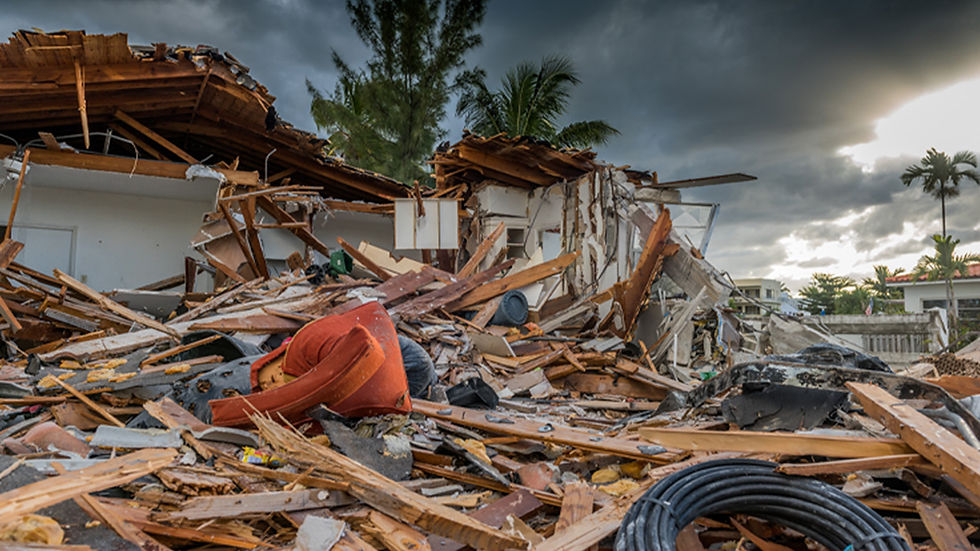Claim Reporting Made Easy: Implement These Expert Tips!
- Jun 14, 2023
- 4 min read
Updated: Oct 22, 2023

POV: A disaster just occurred, and you’re left with extensive property damage. You’re aware of your organization’s pivotal role in community restoration and the resources and assistance that you’re capable of providing. How do you take care of your organization’s issues as quickly and thoroughly as possible so that you can focus on rebuilding your community? Follow these best practices for before and after disasters, as well as tips for properly communicating with your insurance provider and adjusters.
Before the Disaster Disaster preparation is key to minimizing property damage. Luckily, there are a few safety measures you can implement if you are given warning of approaching disastrous weather. Installing flood or sandbags, rolling down shutters, and securing outdoor items are great ways to prepare.
You should also thoroughly read your insurance policy to understand what is covered and what is not. Do you know what your deductible is? How exactly does your policy work? If any questions arise, don’t hesitate to ask your insurance company; no question is too small. To help you understand your insurance policy, United Methodist Insurance has made the Safety and Insurance Handbook for Churches available.
Is your property in a flood zone? If so, consider getting a flood insurance policy from the National Flood Insurance Program (NFIP). More information about the NFIP can be found here.
A physical copy of your policy should always be stored in a safe place, such as a waterproof, fire resistant safe in an office. The Red Cross even recommends storing a copy in your emergency kit so that it will be close by when you need it. Consider storing an electronic copy of your policy, as well as copies of other important documents, on password protected external hard drives or securely in the cloud.
Be sure to conduct a thorough inventory of all damage. In the age of smartphones, taking inventory can be as simple as recording a video of all the rooms in your facilities! Keeping an accurate record of your belongings can make a world of a difference when reporting claims.
After the Disaster Call your insurance company as soon as your property has been damaged. If your property has experienced flood damage and you have a policy with the NFIP, contact their organization to file your claim. Share the photos or video footage of all damage and provide any helpful information to your insurance company or the NFIP. Make all temporary repairs that will stop further damage and remember to keep receipts for those repairs to provide to your adjuster.
Communicating with Adjusters Insurance adjusters will visit your site to assess the damage and assist you with identifying necessary repairs and cost estimates. The total amount of your claim will be based on information observed and shared. If you live or work in an area with extensive property damage, understand that insurance companies may temporarily be experiencing an extremely busy period due to an influx of claims. Although adjusters typically visit sites that have the most severe damage first, insurance companies understand that even small claims can cause big headaches. Hold still as best you can and know that they will get to you as soon as possible.
Key Tips to Remember:
Make sure your insurance company has a reliable way to get in touch with you.
Maintain open and honest communication with adjusters and cooperate by providing any applicable documentation (both of damage and pre-damage).
Do not dispose of any damaged items until your insurance adjuster gives you the go-ahead.
Disasters are heart-wrenching, but your insurance company understands and wants to get your claim settled as much as you do. Do all you can to help your adjusters by maintaining proper communication and damage documentation.
This content has been prepared by United Methodist Insurance Company (UMI) for informational purposes only. No article or document may accurately contemplate all possible scenarios or church resources. As such, this information is meant to foster discussion by the individual church and its members to develop a plan tailored to its own circumstances. UMI is providing this information with no warranties or guarantees of any kind and it should not be viewed as legal, financial, or other professional advice. All liability is expressly disclaimed. Any claim examples described herein are general in nature, may or may not be based on actual claims, and are for informational purposes only. Any coverage available for a claim is determined from the facts and circumstances of the claim as well as the terms and conditions of any applicable policy, including any exclusions or deductibles. In the event of a conflict with the content herein, the terms and conditions of any issued policy will control. Individual coverage may vary and may not be available in all states.
The commercial insurance coverages for United Methodist Insurance are sold and serviced directly or indirectly by Sovereign Insurance Agency (CA Lic. No. 0B01380) ("Sovereign") and underwritten by various available insurance markets. Sovereign pays United Methodist Insurance a royalty for the use of its intellectual property.



